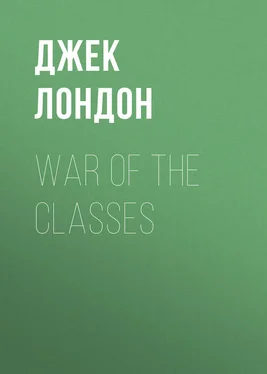Джек Лондон - War of the Classes
Здесь есть возможность читать онлайн «Джек Лондон - War of the Classes» — ознакомительный отрывок электронной книги совершенно бесплатно, а после прочтения отрывка купить полную версию. В некоторых случаях можно слушать аудио, скачать через торрент в формате fb2 и присутствует краткое содержание. Жанр: foreign_antique, foreign_prose, на английском языке. Описание произведения, (предисловие) а так же отзывы посетителей доступны на портале библиотеки ЛибКат.
- Название:War of the Classes
- Автор:
- Жанр:
- Год:неизвестен
- ISBN:нет данных
- Рейтинг книги:5 / 5. Голосов: 1
-
Избранное:Добавить в избранное
- Отзывы:
-
Ваша оценка:
- 100
- 1
- 2
- 3
- 4
- 5
War of the Classes: краткое содержание, описание и аннотация
Предлагаем к чтению аннотацию, описание, краткое содержание или предисловие (зависит от того, что написал сам автор книги «War of the Classes»). Если вы не нашли необходимую информацию о книге — напишите в комментариях, мы постараемся отыскать её.
War of the Classes — читать онлайн ознакомительный отрывок
Ниже представлен текст книги, разбитый по страницам. Система сохранения места последней прочитанной страницы, позволяет с удобством читать онлайн бесплатно книгу «War of the Classes», без необходимости каждый раз заново искать на чём Вы остановились. Поставьте закладку, и сможете в любой момент перейти на страницу, на которой закончили чтение.
Интервал:
Закладка:
Mr. Samuel Gompers, president of the American Federation of Labor, has said: “The workers want more wages; more of the comforts of life; more leisure; more chance for self-improvement as men, as trade-unionists, as citizens. These were the wants of yesterday ; they are the wants of today ; they will be the wants of tomorrow , and of tomorrow’s morrow . The struggle may assume new forms, but the issue is the immemorial one, – an effort of the producers to obtain an increasing measure of the wealth that flows from their production.”
Mr. Henry White, secretary of the United Garment Workers of America and a member of the Industrial Committee of the National Civic Federation, speaking of the National Civic Federation soon after its inception, said: “To fall into one another’s arms, to avow friendship, to express regret at the injury which has been done, would not alter the facts of the situation. Workingmen will continue to demand more pay, and the employer will naturally oppose them. The readiness and ability of the workmen to fight will, as usual, largely determine the amount of their wages or their share in the product.. But when it comes to dividing the proceeds, there is the rub. We can also agree that the larger the product through the employment of labor-saving methods the better, as there will be more to be divided, but again the question of the division… A Conciliation Committee, having the confidence of the community, and composed of men possessing practical knowledge of industrial affairs, can therefore aid in mitigating this antagonism, in preventing avoidable conflicts, in bringing about a truce ; I use the word ‘truce’ because understandings can only be temporary.”
Here is a man who might have owned cattle on a thousand hills, been a lumber baron or a railroad king, had he been born a few years sooner. As it is, he remains in his class, is secretary of the United Garment Workers of America, and is so thoroughly saturated with the class struggle that he speaks of the dispute between capital and labor in terms of war, – workmen fight with employers; it is possible to avoid some conflicts ; in certain cases truces may be, for the time being, effected.
Man being man and a great deal short of the angels, the quarrel over the division of the joint product is irreconcilable. For the last twenty years in the United States, there has been an average of over a thousand strikes per year; and year by year these strikes increase in magnitude, and the front of the labor army grows more imposing. And it is a class struggle, pure and simple. Labor as a class is fighting with capital as a class.
Workingmen will continue to demand more pay, and employers will continue to oppose them. This is the key-note to laissez faire , – everybody for himself and devil take the hindmost. It is upon this that the rampant individualist bases his individualism. It is the let-alone policy, the struggle for existence, which strengthens the strong, destroys the weak, and makes a finer and more capable breed of men. But the individual has passed away and the group has come, for better or worse, and the struggle has become, not a struggle between individuals, but a struggle between groups. So the query rises: Has the individualist never speculated upon the labor group becoming strong enough to destroy the capitalist group, and take to itself and run for itself the machinery of industry? And, further, has the individualist never speculated upon this being still a triumphant expression of individualism, – of group individualism, – if the confusion of terms may be permitted?
But the facts of the class struggle are deeper and more significant than have so far been presented. A million or so of workmen may organize for the pursuit of interests which engender class antagonism and strife, and at the same time be unconscious of what is engendered. But when a million or so of workmen show unmistakable signs of being conscious of their class, – of being, in short, class conscious, – then the situation grows serious. The uncompromising and terrible hatred of the trade-unionist for a scab is the hatred of a class for a traitor to that class, – while the hatred of a trade-unionist for the militia is the hatred of a class for a weapon wielded by the class with which it is fighting. No workman can be true to his class and at the same time be a member of the militia: this is the dictum of the labor leaders.
In the town of the writer, the good citizens, when they get up a Fourth of July parade and invite the labor unions to participate, are informed by the unions that they will not march in the parade if the militia marches. Article 8 of the constitution of the Painters’ and Decorators’ Union of Schenectady provides that a member must not be a “militiaman, special police officer, or deputy marshal in the employ of corporations or individuals during strikes, lockouts, or other labor difficulties, and any member occupying any of the above positions will be debarred from membership.” Mr. William Potter was a member of this union and a member of the National Guard. As a result, because he obeyed the order of the Governor when his company was ordered out to suppress rioting, he was expelled from his union. Also his union demanded his employers, Shafer & Barry, to discharge him from their service. This they complied with, rather than face the threatened strike.
Mr. Robert L. Walker, first lieutenant of the Light Guards, a New Haven militia company, recently resigned. His reason was, that he was a member of the Car Builders’ Union, and that the two organizations were antagonistic to each other. During a New Orleans street-car strike not long ago, a whole company of militia, called out to protect non-union men, resigned in a body. Mr. John Mulholland, president of the International Association of Allied Metal Mechanics, has stated that he does not want the members to join the militia. The Local Trades’ Assembly of Syracuse, New York, has passed a resolution, by unanimous vote, requiring union men who are members of the National Guard to resign, under pain of expulsion, from the unions. The Amalgamated Sheet Metal Workers’ Association has incorporated in its constitution an amendment excluding from membership in its organization “any person a member of the regular army, or of the State militia or naval reserve.” The Illinois State Federation of Labor, at a recent convention, passed without a dissenting vote a resolution declaring that membership in military organizations is a violation of labor union obligations, and requesting all union men to withdraw from the militia. The president of the Federation, Mr. Albert Young, declared that the militia was a menace not only to unions, but to all workers throughout the country.
These instances may be multiplied a thousand fold. The union workmen are becoming conscious of their class, and of the struggle their class is waging with the capitalist class. To be a member of the militia is to be a traitor to the union, for the militia is a weapon wielded by the employers to crush the workers in the struggle between the warring groups.
Another interesting, and even more pregnant, phase of the class struggle is the political aspect of it as displayed by the socialists. Five men, standing together, may perform prodigies; 500 men, marching as marched the historic Five Hundred of Marseilles, may sack a palace and destroy a king; while 500,000 men, passionately preaching the propaganda of a class struggle, waging a class struggle along political lines, and backed by the moral and intellectual support of 10,000,000 more men of like convictions throughout the world, may come pretty close to realizing a class struggle in these United States of ours.
In 1900 these men cast 150,000 votes; two years later, in 1902, they cast 300,000 votes; and in 1904 they cast 450,000. They have behind them a most imposing philosophic and scientific literature; they own illustrated magazines and reviews, high in quality, dignity, and restraint; they possess countless daily and weekly papers which circulate throughout the land, and single papers which have subscribers by the hundreds of thousands; and they literally swamp the working classes in a vast sea of tracts and pamphlets. No political party in the United States, no church organization nor mission effort, has as indefatigable workers as has the socialist party. They multiply themselves, know of no effort nor sacrifice too great to make for the Cause; and “Cause,” with them, is spelled out in capitals. They work for it with a religious zeal, and would die for it with a willingness similar to that of the Christian martyrs.
Читать дальшеИнтервал:
Закладка:
Похожие книги на «War of the Classes»
Представляем Вашему вниманию похожие книги на «War of the Classes» списком для выбора. Мы отобрали схожую по названию и смыслу литературу в надежде предоставить читателям больше вариантов отыскать новые, интересные, ещё непрочитанные произведения.
Обсуждение, отзывы о книге «War of the Classes» и просто собственные мнения читателей. Оставьте ваши комментарии, напишите, что Вы думаете о произведении, его смысле или главных героях. Укажите что конкретно понравилось, а что нет, и почему Вы так считаете.












